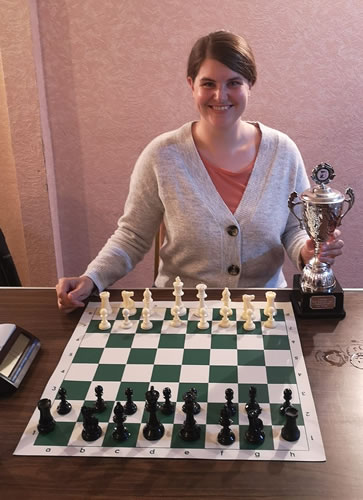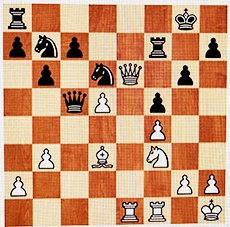
Kate Walker reports on an unprecedented edition of the British Chess Championships, held online in the midst of the pandemic
Playing 19 chess matches in 10 days is tough, but playing 19 matches in the days leading up to Christmas in a British Championship is even tougher! With all chess currently being played online since March 2020, the British Championships 2020 followed suit and set up the tournament on chess.com.
With lots of sections on offer, including standard play, rapidplay, women’s championship and blitz, I decided to enter only two sections as I wanted to focus on the Women’s Championships, with the U2000 serving as a backup if I didn’t qualify.
The two-week tournament began with the Women’s Championship Qualifier played over five matches in a weekend. I had a tough match with a WFM where I felt I played really well (the computer analysis disagrees!) right up until the end where I promptly lost it in a time scramble. At the end of the weekend only the top 12 English players were set to qualify and with a score of 3/5 I was unsure if I would make it. I couldn’t sleep until I knew the result as the finals would be starting the following day. That evening at past midnight I found out that I had just scraped a qualification into the Women’s Championship final, I was really happy but also I knew the challenge was just beginning.
The following morning I was tired but I knew I had to focus on preparing for the first match. There were seven matches ahead of me in the final and I decided to still compete in the U2000, which meant an additional seven matches, but my main focus was on winning games in the Women’s final. My rounds started every day at 1pm (Women’s final) and 4pm (U2000), this was particularly gruelling as I’d often finish a tough women’s match and only have 30minutes until my U2000 match.
Opening Preparation
It wasn’t just the matches that were hard, it was all the preparation that was involved. For each opponent I studied which openings they were most likely to play and then I’d then spend time watching through YouTube videos on the specific opening lines (thank you Stjepan from Hanging Pawns!) Sometimes there would be 2 or 3 different openings variations that I had to learn for each opponent. About 80% of the time my opponents played the opening I’d prepared which meant I knew I could at least get into a decent middlegame. Preparing openings was the only way I felt that I could make my matches competitive at a higher level.
I knew that some of the Women’s Final matches were being streamed live on the Game Changers Chess YouTube channel with commentary from GM Matthew Sadler and WIM Natasha Regan. This made me want to play my best chess as it would’ve been embarrassing to have a bad game and for everyone to know about it.
Anti-Cheating Rules
The Whatsapp groups and Twitter were ripe with accusations of cheaters in the mix. Many of the Whatsapp messages were promptly deleted and players were warned not to discuss those matters in the group. I completely agree with the arbiters decisions on that matter.
All the sections apart from the finals were played as normal in chess.com with anti-cheating software in place on the website. In all the finals the anti-cheating systems were understandably stricter. In the Women’s Final all players had to log onto Zoom one hour before every match and we had to share our microphones and screens. There were two female arbiters who were in charge of watching us and our screens whilst we played. Some of the girls with long hair were asked to pull it back so they could look into their ears to make sure they didn’t have any listening devices on them. We were asked to avoid looking anywhere other than the screen and we weren’t allowed to get up and walk around but we were permitted to go to the toilet, although they’d prefer us not to. If we needed the toilet we had to contact the arbiter in the chat function on Zoom so they knew which move we were on. I found it quite hard being unable to move for a couple of hours and to stare at the screen without looking away, however it did really help me to fully concentrate on the game I was playing.
Computer Problems
Playing online has a different set of challenges to over the board play, the main one being technical issues or a flooded house (as so happened to another player during the tournament!) I worried a lot about my WIFI signal disconnecting or my laptop failing and of course the dreaded mouse slip. I did consequently have one mouse slip but I was lucky that it wasn’t a blunder. I felt frustrated at the time because it gave my opponent a tempo, but I had to brush it off so that I could concentrate on the rest of the game.
In my second to last match in the Women’s Final I logged on to Zoom an hour before that match as I usually did, however, I failed to realise that my microphone wasn’t working until about five minutes before my match was due to start. I was desperately trying to get it to work with the arbiters contacting me to find out what was happening. I eventually had to restart my computer which felt like it took ages as I thought that they would default me. Luckily the arbiters were very nice and they just deducted 10 minutes off my time. It’s particularly stressful to have technical problems during a match and it is something that is increasingly becoming an issue since moving to online chess.
Results and my Favourite Game
My final results for the whole tournament were 3/5 in the Women’s Qualifiers, 2/7 in the Women’s Final and 4/7 in the U2000. I was slightly disappointed with my performance in the Women’s Final as I felt I generally played well but I came across some very strong female players and I learnt a lot from them.
If any players are considering playing in the British Championships I would advise them to do so as it will accelerate their chess learning. When you play that number of games in a short space of time it will help you to identify your strengths and weaknesses. It has helped me to learn new openings, prepare for matches and to maintain a high level of concentration as well as learning how to never make a mouse slip again.
My favourite game in the tournament was against Lara Putar in the Women’s Final where I played white. Although I lost this match it was very exciting and I missed a tactic towards the end. On move 26 black plays Rf7 blocking the check, it looks like black will trap the queen with ideas of 27…. Re8 if white doesn’t move the queen, but can you find a better move for white?

The full game:
Kate Walker v Lara Putar, British Championships 2021, Women’s Finals
1. d4 Nf6 2. c4 g6 3. f3 d5 4. cxd5 Nxd5 5. e4 Nb6 6. Nc3 Bg7 7. Be3 O-O 8. f4 e6 9. Nf3 Nc6 10. Be2 Qe7 11. Qd2 Rd8 12. O-O Na5 13. Qc2 Nbc4 14. Bf2 b6 15. b3 Nd6 16. Bh4 f6 17. d5 Bb7 18. Bd3 exd5 19. Nxd5 Bxd5 20. exd5 Qe3+ 21. Kh1 Nab7 22. Rae1 Qc5 23. Qb2 f5 24. Bf6 Bxf6 25. Qxf6 Rf8 26. Qe6+ Rf7 27. Qe5 Re8 28. Qb2 Rfe7 29. Rxe7 Rxe7 30. Qf6 Ne8 31. Qg5 Ng7 32. Bc4 Qd6 33. Ne5 Re8 34. g4 b5 35. Be2 fxg4 36. Bxg4 Nc5 37. h4 Qxd5+ 38. Bf3 Qe6 39. Kh2 Qf5 40. Qg3 Ne4 41. Qg2 Qxf4+ 42. Kg1 Qe3+ 43. Kh2 Rxe5 44. Rd1 Qf4+ 45. Kg1 Ne6 46. Kf1 Rf5 47. Rd3 Qc1+ 48. Ke2 Nf4# 0-1
Kate Walker – 20 January 2021